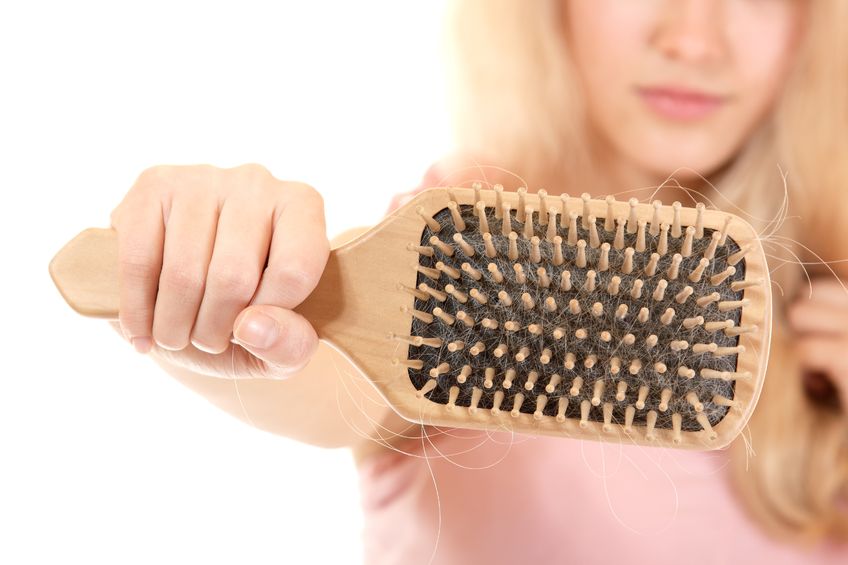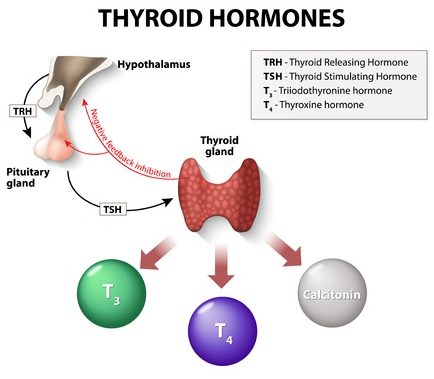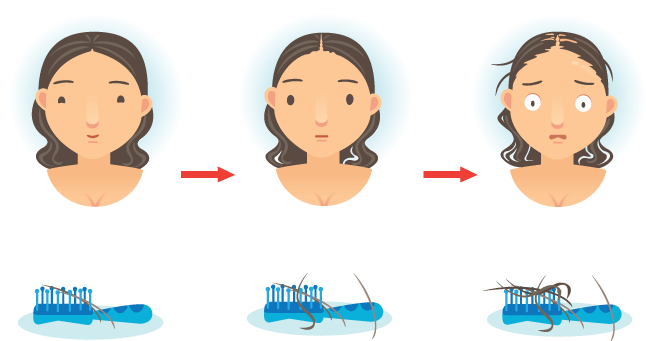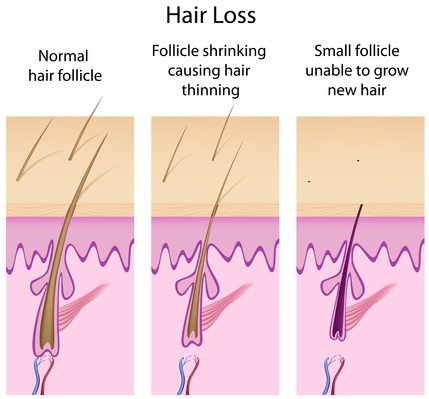
Table of Contents
Last Updated on
The butterfly-shaped thyroid gland releases hormones that regulate metabolism and participates in numerous bodily functions including breathing, cholesterol levels, body temperature, muscle strength, body weight, central and peripheral nervous systems, and many others. When the thyroid gland does not function properly, a person experiences different symptoms including hair loss. What is the connection between your thyroid and hair loss? Is there anything you can do minimize the effects of this symptom?
Hair Loss and Thyroid
Hair follicles follow a natural cycle characterized by two phases: hair growth and resting. Typically, most of your hair is growing while only a small portion is resting. Different factors usually involving changes in your body, can disrupt this cycle. As a result, hair can rest too much while the growth phase shortens significantly, thus leading to hair loss, thinning, and even balding.
Various health conditions can lead to hair loss, but in some cases, thyroid problems are to blame. Evidence shows that endocrine disorders including hyperthyroidism, hypothyroidism, and parathyroid disorders can cause hair loss. While many other symptoms are usually characteristic either for hyper- or hypothyroidism, hair loss can occur in both. It’s not just scalp hair that is affected, but the hair on other parts of your body including eyebrows. Of course, for most people loss of scalp and facial hair is a major confidence blow.
If you are wondering why do thyroid problems cause hair loss the answer is simple – that is because thyroid hormones are crucial for the development and maintenance of the hair follicle.
Thyroid hormone and hair growth
Scientists from Germany carried out a study whose primary objective was to assess the impact of thyroid hormones T3/T4 on human hair follicles. For the purpose of their research, they isolated human anagen hair follicles from the skin of women undergoing facelift procedure. All women were between 40 and 69 years old and their hair follicles were cultured and treated with T3 and T4.
The findings of this study showed that T4 regulates the proliferation of hair matrix keratinocytes. On the other hand, the apoptosis of hair matrix keratinocytes is down-regulated by both T3 and T4. The study also discovered that T4 extends the duration of hair growth phase thanks to the down-regulation of the key anagen inhibitory growth factor called TGF-beta2. Scientists concluded the study explaining that human hair follicles are directly influenced by thyroid hormones T3 and T4.
Hypothyroidism/hyperthyroidism and hair loss
Hair loss is a common symptom of both thyroid disorders. For instance, a research study showed that hypothyroidism isn’t only associated with skin changes, but hair growth suffers too. The study used mice and found that those lacking TRα1 and TRβ, the main thyroid hormone binding isoforms, experienced disrupted hair cycling. This impaired hair growth cycle was strongly linked to a decline in follicular hair cell proliferation.
Additionally, Egyptian scientists carried out a study to investigate whether alopecia areata (spot baldness) was linked to thyroid autoimmunity and thyroid function abnormalities in 50 participants. They discovered that subclinical hypothyroidism was recorded in 16% cases. There were major differences between hypothyroidism patients and controls regarding T3 and T4 levels. Based on these results, scientists concluded that patients with alopecia should also be screened for hypothyroidism as these two conditions are connected.
When the thyroid produces an insufficient amount of much-needed hormones, the body is unable to metabolize protein properly. This is bad if you want to long luscious hair because these proteins is vital for hair growth. At the same time, acid levels in your stomach decline and don’t allow you to absorb essential nutrients that support healthy hair growth process.

Although hair loss is a well-known symptom of thyroid disorders, there is still research ongoing. The current research focuses on hypothyroidism primarily. However, hyperthyroidism patients can also experience this unfortunate scenario due to the fact the disorder triggers telogen effluvium. Telogen effluvium is a form of non-scarring alopecia indicated by diffuse hair shedding. The condition is a reactive process i.e. it is caused by metabolic or hormonal stress or due to medications. Additionally, higher production of thyroid hormones can also cause hair graying, which is a common symptom of Grave’s disease.
As you can see, the relationship between thyroid problems and hair loss is evident. The British Thyroid Foundation explains that hair loss due to thyroid abnormalities is usually diffuse. Diffuse hair loss is not a condition, but a particular pattern of hair loss. For example, it does not affect one particular spot but affects all areas equally, but back and sides are more resilient to it. In patients with thyroid problems, hair appears uniformly sparse, but re-growth is possible with successful treatment. Bear in mind that the treatment requires a lot of time and patience.
 When does hair loss occur?
When does hair loss occur?
Hair loss due to thyroid problems doesn’t occur overnight. In most cases, hair loss becomes apparent several months after a patient develops the condition. Diagnosing both hyper- and hypothyroidism can be quite difficult because we tend to assume symptoms we experience are related to something else. That is why hair loss is one of the most important telltale signs that point out to thyroid problems.
Is it possible to prevent or stop hair loss?
Just like with other health-related problems, it is all about the early diagnosis. Besides recommending the adequate treatment for your condition, the doctor can also help you minimize hair loss. The goal of the treatment is to restore the balance in thyroid hormone production. Healthy hormones mean healthy hair growth! Hypothyroidism patients receive medications that support the production of thyroid hormones while individuals who struggle with hyperthyroidism get anti-thyroid drugs.
Things you can do about hair loss
Although hair loss itself is not dangerous, it has a major impact on our confidence. Lack of confidence prevents us from being social and it is a source of stress. Hair loss is not unmanageable; you can tackle it successfully by adhering to the treatment prescribed by your doctor. Other things you can do are:
- Get an evaluation – don’t automatically assume that hair loss is a sign of thyroid problems. Yes, overstimulation and insufficient production of thyroid hormones are the most common causes of hair loss due to some health condition, but you can start losing hair because of other reasons too, including infection. So, if you notice you’re losing hair, consult your doctor, a healthcare provider who focuses on hair loss, even a dermatologist. The latter will inform you whether hair loss is a result of an infection
- Consider medications you’re taking – this is particularly useful if you have hypothyroidism. Why? It is because hair loss is a common side effect of common pills that are prescribed for this condition
- Get a nourishing shampoo – the role of a shampoo isn’t only to help clean the scalp and make your hair shiny, it should nourish both skin and hair at the same time. Ideally, you should look for products that are specifically formulated to stop hair loss and shampoos with hydrating ingredients
- Natural treatments – Thyroid supplements may be able to improve your thyroid disorders and thus in extension, improve the health of your hair as well
- Try evening primrose oil – it is abundant in gamma-linoleic acid, an Omega-6 fatty acid, known for hair growth-stimulating effects. Also, this oil prevents the conversion of testosterone to DHT thus curbing hair fall. You can use primrose oil in the form of dietary supplements or apply it onto your scalp regularly
Conclusion
Thyroid problems induce a wide array of symptoms including hair loss. Both hyperthyroidism and hypothyroidism can lead to hair loss, but it is possible to overcome this issue by establishing the balance in hormone production.

Get a second opinion from another doctor!
I have been taking Levothyroxine for possible Hypothyroidism since 9/18/17. When I read the side effects and hair loss, I was scared of losing my hair. My hair is thinning so bad since taking this medication and to me, this medication is poison. The thyroid symptoms are still the same, with no improvement, whatsoever. What do you recommend for my hair to build it back to the normal hair I used to have. I am very concerned about this and the dr. just ignores the situation. I certainly do not want to be bald the rest of my life.